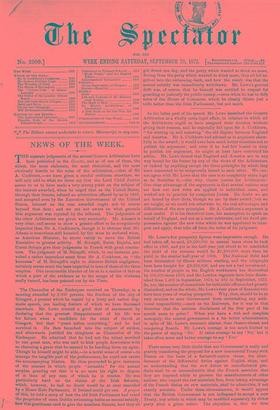In the latter part of his speech Mr. Lowe described
the Geneva - Arbitration as a wholly extra-legal affair, in relation to which all the Arbitrators ought to have assigned their decision without giving their reasons, and he especially fell upon Sir A. Cockburn, "for stirring up and renewing" the old dispute between England and America. Sir A. Cockburn had advised us to acquiesce cheer- fully in the award; it would have been much better therefore not to publish his argument; and even if he had felt bound in duty to publish his argument, he might at least have restricted his advice. Mr. Lowe denied that England and America are in any way bound for the future by any of the views of the Arbitrators, or indeed by anything except the three principles by which they have consented to be reciprocally bound to each other. We can- not agree with Mr. Lowe that the case is so completely extra-legal as he describes it,—else why choose jurists for Arbitrators? One clear advantage of the arguments is that neutral nations may see how our new rules are applied to individual cases, and worked out in practice by competent jurists. No doubt we are not bound by their dicta, though we are by their award ; but we are taught, as we could not otherwise be, the real advantages and difficulties of the new principles. Sir A. Cockburn'e argument is most useful. It is his rhetorical tone, his assumption to speak on behalf of England, and not as a mere arbitrator, and his fixed pre- possession against the new rules which he was appointed to inter- pret and apply, that take off from the value of his judgment.


































